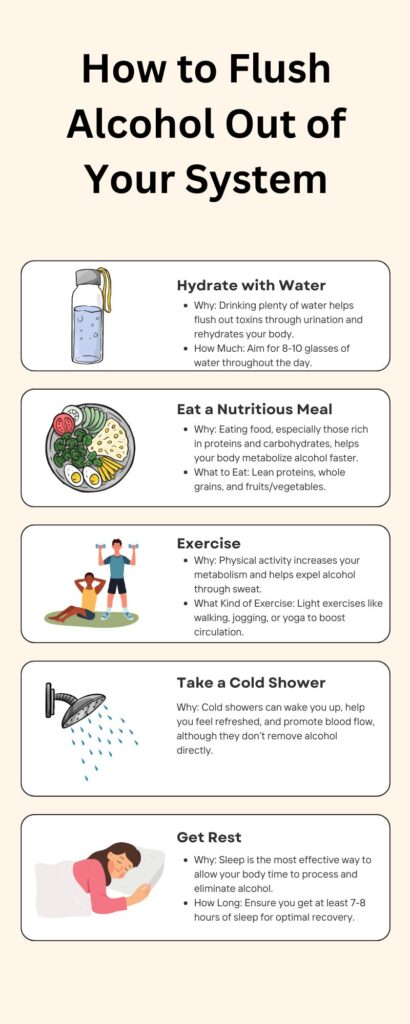Flushing alcohol out of your system involves helping your body metabolize and eliminate the substance more efficiently. To support your body as it removes alcohol from your system, you can practice healthy habits. Keep reading to learn how to flush alcohol out of your system and seek treatment for alcohol addiction if necessary.
Understanding Alcohol Metabolism
Alcohol is processed by the liver, which breaks it down into acetaldehyde and then into acetic acid before being excreted. The rate at which alcohol is metabolized can be influenced by various factors, including age, weight, and overall health.
Steps to Flush Alcohol from Your System
There are several steps you can take to support your body as it flushes alcohol from your system.
- Hydrate: Drinking plenty of water is crucial for flushing alcohol from your system. Staying hydrated helps the kidneys and liver function more effectively, aiding in the removal of alcohol and its byproducts. It’s important to drink beverages with electrolytes as well to help your body retain its hydration.
- Eat Nutritious Foods: Consuming a balanced diet can support liver health and improve the metabolism of alcohol. Focus on foods rich in vitamins and minerals, such as fruits, vegetables, lean proteins, and whole grains.
- Exercise: Engaging in regular physical activity can help your body metabolize alcohol more efficiently. Exercise promotes circulation and supports overall detoxification processes.
- Avoid Caffeine and Sugary Drinks: While caffeine might seem like a good option for staying awake, it can exacerbate dehydration. Avoid sugary or caffeinated beverages that can disrupt hydration and recovery.
- Rest and Sleep: Adequate rest is essential for the body to recover from alcohol consumption. Allow your body time to heal and detoxify by getting sufficient sleep.
- Consider Detox Supplements: Some detox supplements claim to support liver health and alcohol metabolism. Consult with a healthcare professional before using any supplements to ensure they are safe and effective.

How To Detox From Alcohol
Depending on the severity of your dependence on alcohol, once you’ve removed alcohol from your system, you may start to feel the effects of withdrawal. If this happens, there are steps you can take to make this process more comfortable.
Detoxing from alcohol is a crucial step in overcoming alcohol addiction. Alcohol detox involves eliminating alcohol from the body and managing withdrawal symptoms. Withdrawal can vary in intensity, ranging from mild to severe, depending on the level of alcohol dependence.
Steps to Detox Safely
- Seek Medical Supervision: Detoxing from alcohol can be challenging and potentially dangerous. Medical supervision is essential for managing withdrawal symptoms and ensuring safety.
- Gradual Reduction: Reducing alcohol intake gradually, under medical guidance, can help minimize withdrawal symptoms and prevent complications.
- Medications: Medications may be prescribed to manage withdrawal symptoms and reduce cravings. Commonly used medications include benzodiazepines and other supportive drugs.
- Hydration and Nutrition: Maintaining proper hydration and nutrition is crucial during detox. Drink plenty of water and eat balanced meals to support your body’s recovery.
- Create a Safe Environment: Ensure a safe and comfortable environment during detox. This includes having access to medical care, emotional support, and a structured routine.
Alcohol withdrawal symptoms can be serious depending on an individual’s addiction history. Medical supervision by trained professionals can help individuals progress through detox safely.
Detoxing from alcohol is just the first step in recovery. Long-term support through counseling, therapy, and support groups is essential for maintaining sobriety and addressing underlying issues.
How Does Alcohol Affect Mental Health?
Alcohol consumption can have significant effects on mental health, both in the short-term and long-term.
Short-Term Effects
- Impaired Judgment: Alcohol impairs cognitive functions, leading to poor decision-making and risky behavior. This can result in accidents, injuries, and legal issues.
- Mood Swings: Alcohol can cause mood swings, ranging from euphoria to aggression or sadness. These mood changes can impact relationships and social interactions.
- Anxiety and Depression: Alcohol use can exacerbate feelings of anxiety and depression. While it might provide temporary relief, it often worsens these conditions over time.
Long-Term Effects
- Chronic Mental Health Disorders: Prolonged alcohol use can lead to chronic mental health disorders, including depression, anxiety disorders, and cognitive impairments.
- Memory and Cognitive Impairment: Long-term alcohol use can cause memory loss, cognitive decline, and difficulties with concentration. This can impact daily functioning and quality of life.
- Increased Risk of Mental Health Disorders: Chronic alcohol use is associated with an increased risk of developing mental health disorders, such as bipolar disorder and schizophrenia.
Get Help for Alcohol Addiction
If you struggle with alcohol dependence, consider seeking professional help for addiction treatment. Comprehensive alcohol rehab programs offer support for managing alcohol use and achieving long-term recovery.
Ray Recovery is one such alcohol rehab center. Our outpatient alcohol addiction treatment services integrate both evidence-based and holistic therapies for a comprehensive treatment approach. We recognize the importance of individualized care, and so we personalize our treatment plans to the needs of each client.
If you or a loved one are seeking support in overcoming alcohol addiction, contact our team today to learn more about how we can help.


